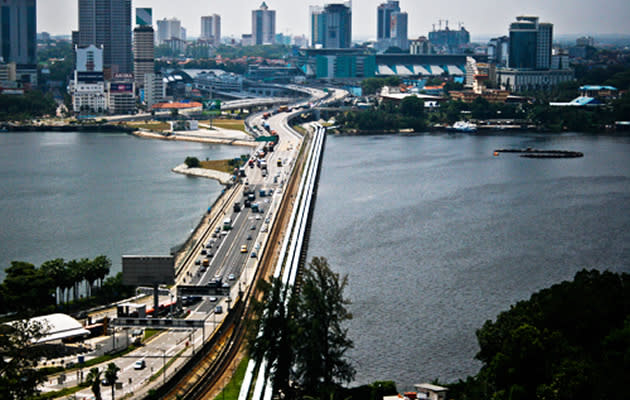Handover will not affect S’pore’s water supply: Dr Balakrishnan

Environment and Water Resources Minister Dr Vivian Balakrishnan says the expiration of the 1961 water agreement between Singapore and Malaysia will not affect the country's water supply.
He was speaking at the historic handover of two water treatment plants and two pump houses in north-west Johor Baru -- all previously managed by Singapore's Public Utilities Board (PUB) -- to Johor's authorities on Wednesday morning.
Dr Balakrishnan pointed out that Singapore is in "a position of strength" as it works its way towards achieving water self-sufficiency by 2061 -- when all of the country's water agreements with Malaysia expire.
According to The Straits Times, he said: "We are on schedule (to reach self-sufficiency). We still have the 1962 agreement, supplemented by the 1990 agreement, in place and that will run all the way till 2061, That agreement, together with developments at a local level, puts us in a very safe position."
Dr Balakrishnan added that Singapore's daily demand of 380 million gallons can be increasingly met with developments such as more reservoirs and improvements in NEWater and desalination technology.
If all goes to plan, NEWater and desalinated water's contribution to the country's supply would be increasing from the current 40 per cent to 80 per cent by 2061.
With the ending of the current agreement -- which has provided up to 5 per cent of Singapore's total water needs for the past 50 years, the country can no longer draw water from the water catchment area in Johor Baru.
The other water agreement with Malaysia -- signed in 1962 and subsequently supplemented in 1990 -- are still in force.
In a ceremony at a scenic dam at Gunung Pulai in Johor, the PUB and Johor government signed an agreement to formalise the handover.
The signing was witnessed by Dr Balakrishnan, Johor Sultan Ibrahim Iskandar and Johor Chief Minister Abdul Ghani Othman.
In addition to the treatment plants and pump houses, administrative buildings and workers' living quarters in the areas were handed over as well.
Speaking to Malaysian media, Chief Minister Abdul Ghani said: "The water treatment plants in Skudai and Gunung Pulai and the two water pumps in Tebrau and Pontian will be upgraded if necessary to meet the needs of our residents."
The PUB said it has trained 60 workers since January to take over operations after the handover. Some of the 95 Malaysian employees previously hired by PUB will be transferred to other plants, as others chose to stop working at the facilities.
Before the 1961 agreement expired on Wednesday, Singapore was importing water from Johor under two separate agreements.
The 1961 agreement gave Singapore drawing rights over the Gunung Pulai, Sungei Tebrau and Sungei Skudai areas for 50 years. Singapore paid a yearly rent of $5 an acre for land and was charged 3 sen for every 1,000 gallons of raw water.
The 1962 agreement, which expires in 2061, allowed Singapore to buy more raw water -- up to 250 million gallons a day -- at the same price, this time from the Johor River.
A supplementary agreement in 1990 approved of the construction of a dam across the Johor River and for Singapore to purchase over and above 250 million gallons a day.
Dr Balakrishnan said yesterday that the seamless and amicable transfer finalised yesterday confirmed that Singapore-Malaysia relations are "stable" and "deepening".
He added that the handover on good terms was symbolic of deepening ties between the two neighbours.

